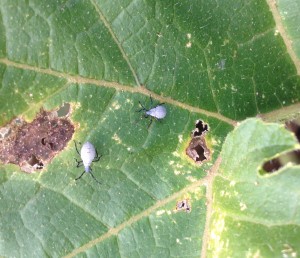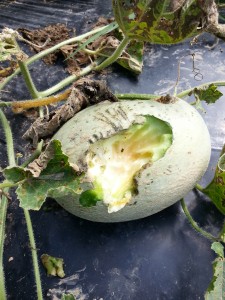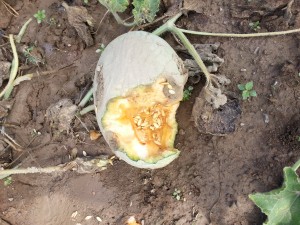Squash Bug Nymphs
Raccoon Damage in Pumpkins and Melons
Downy Mildew
Click her for more information about Downy Mildew
→ Although it is about grapes, it will give you the basic understanding of the disease.
Phytophthora
These are all photos of Phytophthora disease. The photos are of watermelons and eggplants.
Week of August 11 – 15 Scouting Summary Report
AGRONOMIC CROPS:
- Corn: Scouted fields ranged from VT to R3 milk stage. As corn enters brown silk, scouting comes to an end on these fields.
- Soybeans: Many soybeans in the R1 to R4 stage of development. Japanese beetle and grasshopper feeding damage were found at low levels in most fields. Stink bugs are being caught in sweep net samples. Most field still below threshold, but a few fields noted at just below or right at threshold levels. A few fields with while mold were found this week.
- Alfalfa: Some fields were cut for 3rd harvest, others are growing back from 3rd harvest. Potato leaf hopper numbers remain low.
Week of August 11 – 15 Scouting Summary Report
VEGETABLES:
- Cole crops: Cabbage, Cauliflower and Broccoli: In several fall harvest plantings of cole crops cabbage worm numbers were increasing and some growers were advised to treat where numbers reached economic threshold levels.
- High tunnel tomatoes: Early blight is present in many high tunnels, growers are encouraged to maintain a regular and consistent spray program. Yellow shoulder and blossom end rot, primarily abiotic conditions are also being noted by scouts. Damage by tomato hornworm was heavy in several high tunnels this week. Other insect pests noted by scouts this week included tomato fruit worm, variegated climbing cutworm and two-spotted spider mites.
- Field tomatoes: Bacterial speck, spot and canker all being found on plants. In some plantings bacterial spot, speck, and canker are being found on the tomato fruit. Early blight and septoria leaf spot are found in many plantings. Blossom end-rot, and yellow shoulder are also being found. Damage by tomato horn worms and variegated climbing cutworms was noted.
- Sweet corn: Development stages range from some v6 for late planted corn to harvest on some plantings. One corn earworm moth was found at one of the three locations where traps are set. Eastern corn borer moth trap counts were lower this past week with only 5 moths recorded at one of 3 trap locations. Fall armyworm feeding damage was seen in some fields and in one field the damage surpassed the economic threshold and treatment was recommended. In many fields, deer are a much bigger problem than insects or disease.
- Cucumbers: The big news this week is that downy mildew was confirmed from a cucumber plant sample taken from Wayne County. Growers in the region should be on a protective spray program against downy mildew from now until the end of harvest. Harvest is under way in some plantings and there have been some plantings made for intended fall harvest. Cucumber beetles were reported at high levels in some of the young cucumber plantings. Powdery mildew is showing up in many plantings.
- Zucchini and Summer Squash: Cucumber beetle numbers remained low this past week. Squash bug nymphs were seen. Angular leaf spot and powdery mildew are present in most if not all plantings.
- Winter Squash and Pumpkins: Cucumber beetle numbers in several plantings increased to above threshold numbers. Damage by the squash vine borer was noted on some plants. Angular leaf spot, anthracnose, bacterial wilt and powdery mildew are present in many plantings. Scouts noted feeding damage by deer, groundhogs and racoons. Some of the raccoon damage was very discouraging as raccoons had scooped holes into a number of the fruit.
- Melons: Angular leaf spot,fusarium wilt, and phytophthora blight have been found. Some cucumber beetle damage to melon fruit was noted.
- Potatoes: Some harvest of potatoes has started. Early blight was noted in some plantings. Colorado potato beetles (CPB) were lower this week.
- Peppers: Bacterial spot continues to develop. Blossom end rot can also be found. A few plantings had fruit with bacterial soft rot. Some of the soft rot can be attributed to fruit damage caused by corn borer larvae.
- Eggplant: Anthracnose found on some plants. This week scouts found some plantings with high numbers of flea beetles well above threshold levels. Colorado potato beetle and stink bugs were also noted.
- Green/Snap Beans: Beans generally look very good.
Week of August 11 – 15 Scouting Summary Report
FRUIT:
- Apples: Fruit is developing. Codling moth numbers in traps remained high once again this week. Apple maggot trap numbers were 0 across all orchards. Red mites and two-spotted spider mites were found at above treatment threshold numbers in a few orchards.
- Grapes: Spotted wing drosophila (SWD) were identified from traps in grapes at 2 locations this past week. Japanese beetles and stinkbugs were also found at low numbers in some vineyards. Black rot is present in some vineyards.
- Blueberries: Blueberry picking is concluding. SWD were present in traps. Blueberry maggot traps have remained at 0.
Week of August 4 – 8 Scouting Report Summary
FRUIT:
- Apples: Fruit is developing. Codling moth numbers in traps remained high this week. Apple maggot trap numbers were 0 across all orchards. Woolly apple aphids were found by scouts at low numbers in a few orchards. Green apple aphids, red mites and two-spotted spider mites were all found at above treatment threshold numbers in a few orchards.
- Grapes: Spotted wing drosophila were identified in one trap placed in grapes this past week. Japanese beetles and stinkbugs were also found at low numbers in some vineyards.
- Blueberries: SWD have been found in blueberry traps. Growers with ripening fruit should consider a preventative spray program. Blueberry maggot traps have remained at 0.
Week of August 4 – 8 Scouting Report Summary
VEGETABLES:
- Cole crops: Cabbage, Cauliflower and Broccoli: In several fall harvest plantings of cole crops flea beetle numbers increased to above treatment threshold. Some growers were also advised to start protectant sprays against cabbage worms. Anthracnose was detected in some fall plantings.
- High tunnel tomatoes: Early blight continues to progress in many high tunnels, growers are encouraged to maintain a regular and consistent spray program. Bacterial spot and speck are present in some plantings. Some bacterial soft rot was found. Yellow shoulder and blossom end rot, primarily abiotic conditions are also being noted by scouts. Damage by tomato hornworm, tomato fruitworm and variegated climbing cutworm were all found by scouts this week. Two-spotted spider mites were also found.
- Field tomatoes: Bacterial speck, spot and canker all being found on plants. In some plantings bacterial spot, speck, and canker are being found on the tomato fruit. Early blight and septoria leaf spot incidence is increasing. Blossom end-rot, and yellow shoulder are also being found. Damage by variegated climbing cutworms was noted.
- Sweet corn: Development stages range from some v4 for late planted corn to harvest on some plantings. One corn earworm moth was found at one of the three locations where traps are set. Eastern corn borer moth trap count was 19 spread over 3 locations, a slight decrease in moth numbers from the previous week. Western bean cutworm larvae were found in one field at numbers above the treatment threshold. Some corn rootworm beetles were noted in some sweet corn fields. Four stink bugs were caught in one trap, and one of those was the brown marmorated stink bug. In many fields, deer are a much bigger problem than insects or disease.
- Cucumbers: Harvest is under way in some plantings and there have been some plantings made for intended fall harvest. Cucumber beetles were reported at high levels in some of the young cucumber plantings. Powdery mildew is showing up in many plantings.
- Zucchini and Summer Squash: Development ranges from plantings a couple of weeks old to full harvest. Cucumber beetle numbers were lower than the previous week. Squash bug adults and eggs can be seen in some fields at low levels. Angular leaf spot and powdery mildew are present in most if not all plantings. Fusarium wilt was found this past week.
- Winter Squash and Pumpkins: Cucumber beetle numbers in several plantings increased to above threshold numbers. Damage by the squash vine borer was noted on some plants. Angular leaf spot, anthracnose, bacterial wilt and powdery mildew are present in many plantings. Scouts noted feeding damage by deer, groundhogs and racoons. Some of the raccoon damage was very heavy, with
- Melons: Angular leaf spot,fusarium wilt, and phytophthora blight have been found. Cucumber beetle numbers were light this week. A few squash bugs were found on melons.
- Potatoes: Some early harvest of potatoes has started. Colorado potato beetles (CPB) were causing heavy defoliation in some plantings.
- Peppers: Bacterial spot continues to develop. Blossom end rot can also be found. A few plantings had fruit with bacterial soft rot. Some of the soft rot can be attributed to fruit damage caused by corn borer larvae. Aphids were detected on some plants along with a good number of lady beetles.
- Eggplant: Anthracnose found on some plants. This week scouts found some plantings with high numbers of flea beetles well above threshold levels. Colorado potato beetle feeding damage was also found.
- Green/Snap Beans: Beans generally look very good. Some light feeding damage by Japanese beetles in some plantings was noted.













